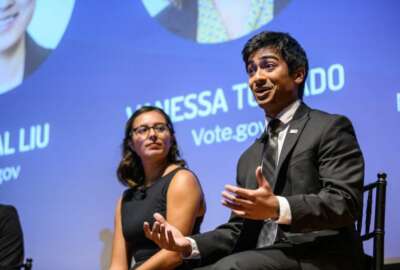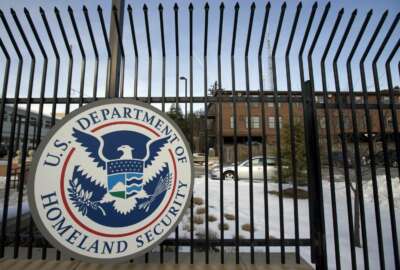White House launches a new round of tech recruitment to nail down big problems
U.S. Digital Corps will bring in two-year fellows to be assigned throughout the government.
Best listening experience is on Chrome, Firefox or Safari. Subscribe to Federal Drive’s daily audio interviews on Apple Podcasts or PodcastOne.
The Biden administration has launched a new version of a program that’s helped agencies solve pressing technology problems. U.S. Digital Corps will bring in two-year fellows to be assigned throughout the government. will bring in two-year fellows to be assigned throughout the government. For details, Federal Drive with Tom Temin turn to the director of the Technology Transformation Service at the General Services Administration Dave Zvenyach.
Interview transcript:
Tom Temin: Mr. Zvenyach, good to have you on.
Dave Zvenyach: Thanks so much for having me here.
Tom Temin: Now, this sounds a little familiar to other administrations’ efforts to recruit techies into government for short periods of time. What’s different this time around?
Dave Zvenyach: As you correctly note, there have been a number of different programs over the years to bring in technologists into government, things like the US Digital Service, things like the Presidential Innovation Fellows Program, and ETF and the like. Those programs were really designed to bring in mid-to-late career technologists. And it’s through the execution of those programs, that we really started to see a gap that even though these programs were bringing in really excellent and skilled technologists who had no prior government experience or maybe had been in government before into the fray. We weren’t able to bring in early career technologists into government. And so this program is really trying to meet that gap to bring in junior technologists, really the next generation of leaders into governments to solve the problems that we know exist. And to, like I said, meet the challenges with those early career technologists.
Tom Temin: And is it fair to say that when you say technologists, you mean information technologists? You’re not going to bring in aerospace engineers?
Dave Zvenyach: That’s correct. So we’re looking at a couple of different disciplines, things like data science, product management, cybersecurity, engineering, and the like.
Tom Temin: And this program is multi-agency with GSA, as is often the case, the agent for carrying it out. Who are your partners here?
Dave Zvenyach: Well, we have a number of partners. We’ve been working really closely in the design of the program with the Office of Personnel Management and the Office of Management and Budget initially, but we also have a number of agency partners: [Cybersecurity and Infrastructure Security Agency], the Veterans Administration, [Centers for Medicare and Medicaid Services], and [Consumer Financial Protection Bureau], as well as GSA are sort of our initial partners where we’re going to be deploying fellows. But there are a whole range of, like I said, partners, [Office of Science and Technology Policy], has been really engaged and making sure that we get this program off the ground. And we think that’s important. This is not just a GSA program, it really is supposed to be a government wide program, and we look forward to scaling it.
Tom Temin: And will they, at GSA, be in U.S. Digital Service, or the F-18 group, or where will they actually go?
Dave Zvenyach: So they will be initially hired into the General Services Administration, and then they will be working as similar to the Presidential Innovation Fellows Program, they will be working at another agency. But we’ll have home base as GSA, so they’ll be working closely with other agencies, but we’ll still call GSA home.
Tom Temin: And these are term employees?
Dave Zvenyach: So they will come on as a two-year initial fellowship. And our goal is that we want these fellows to become federal employees.
Tom Temin: So that’s a big difference from some of the earlier ones where people were expected to come in, do their part, leave their imprint on public service, but then go back to where they came from, or some other industry.
Dave Zvenyach: That’s actually one of the great lessons that we’ve had from those earlier programs, things like the Presidential Innovation Fellows Program has had extraordinary retention, frankly. We hired folks that had no prior government experience, folks that could do anything else. And they really fell in love with the mission and the work of government and chose to stay and to become leaders throughout the federal government. And I think that’s a credit to obviously the program. Also, it speaks to the importance of the mission. And it speaks to just how meaningful the work that the federal government does, and the quality of public servants.
Tom Temin: And will they be geographically dispersed, or will they all come into D.C.?
Dave Zvenyach: You know, I don’t think anyone knows the answer to that. As we sit right here, right now, we are not in person, we are still geographically dispersed. I’m here in Wisconsin, I presume you’re in the Beltway. And I don’t know what that’s going to look like at the time the fellowship actually gets off the ground. So TBD, we’ll see how this looks when this gets off the ground.
Tom Temin: And when you say you’re looking at early career people so they could be possibly in graduate school or even in college, four-year school, or they could be say, in their 20’s out in a career already? And do you have a kind of model in your mind?
Dave Zvenyach: And actually, it’s a great point, because I want to really – I want to be clear about something. You know, when we say early career, I don’t mean “young” necessarily, I don’t even mean recent graduates. We’re looking for folks who are early career technologists. These may be folks who are coming out of a coding boot camp, they may have come through reskilling, they may be coming out of your apprenticeship, they may be coming out of the military, they may be coming out of graduate school. We’re really looking at a range of experience in terms of where folks may be coming from, but are just starting out as technologists and really trying to get into a meaningful experience as a technologist.
Tom Temin: We’re speaking with Dave Zvenyach. He is director of the Technology Transformation Service at the General Services Administration. And how are you making this known publicly? And what are some of the timelines here for getting in applications?
Dave Zvenyach: Yeah, so we launched just recently, and so we’re trying to speak widely and broadly. We’re obviously doing a lot of media outreach. But one of the things that I think is really important is that we want to get out into the community. So that’s going to be meeting folks where they are. The lesson that – we have a couple of folks that have done this work before where they recruited early-career technologists and the lesson that they have shared with me is that you cannot compete for early career talent by just putting something on the job board and calling it a day. You really have to get out into the community, you have to make sure that you’re involved with civic technical organizations that you’re getting into the universities, you’re getting involved with coding boot camps, getting to know the professors, getting to know sort of the folks and helping them understand the opportunity and building a network and building the reputation that really is necessary so that people can understand the opportunities that are available to them.
Tom Temin: This interagency group that is piloting this whole project and through GSA, do you have any particular technical issues in the government in mind already that needs solving?
Dave Zvenyach: I think there are many. One of the things that we will say, though, is that we want to make sure that the fellows are a good fit for the projects. It’s really important to me, it’s really important for the program. And it’s ultimately really important for, going to be important for the fellows and the agencies that they work with, that we set the fellows and the agencies up for success. So if the fellow goes in, and they don’t have the requisite skills, and they’re on a project, it’s not going to work. So we want to make sure that we are selecting fellows and projects and matching them well together. So at the moment, we have a couple of ideas. But we don’t want to be too specific until we have a clear sense of what the candidates are going to look like and what the projects that will be the best fit will be.
Tom Temin: And how will they be chosen, the finalists, the ones that come in from the applicant pool?
Dave Zvenyach: Well that will all be spelled out in the position description. If you go to our website at digitalcorps.gsa.gov, you can sign up for our mailing list. When we do launch later this fall, you’ll be able to apply there, and it’ll provide all of the qualifications that will be necessary in order to apply. And it’ll spell it all out up there.
Tom Temin: And what if U.S. Digital Service people or 18-F people say to you, “Hey, that should have been our project. We’re sitting around here, why not give us that project? We’re already in the government?”
Dave Zvenyach: Well, I hope that actually they’ll work together. I really do think that one of the things that U.S. Digital Service and 18-F and all the digital services teams, and frankly, all of the technologists in government should welcome the opportunity to work with early career technologists. One of the things that will be important, I think, both for the junior technologists and the fellows, as well as frankly, some more of the senior technologists is the opportunity for mentorship. Having worked with folks who are just coming up into the trade as it were, you really learn a lot of things from them, and but you also impart a lot of wisdom to them. And so that mentorship program that we’re planning on making part of this work will be useful, as well as frankly, becoming just part of the team. I think we view and certainly I view my work at the TTS as a partnership. When we work with other agencies, it’s not my work or your work. It’s all partnership to really make sure that we’re delivering value to the American public. And so I would be pretty frustrated to hear if ATF were out there saying, hey, that should be my work. Ultimately, we’re delivering value to the American public, and I’d expect that to be true for U.S. Digital Corps will bring in two-year fellows to be assigned throughout the government. just as much as it be true for 18-F.
Tom Temin: Dave Zvenyach is director of the Technology Transformation Service at the GSA. Thanks so much for joining me.
Dave Zvenyach: Thanks so much for having me.
Copyright © 2025 Federal News Network. All rights reserved. This website is not intended for users located within the European Economic Area.
Tom Temin is host of the Federal Drive and has been providing insight on federal technology and management issues for more than 30 years.
Follow @tteminWFED






